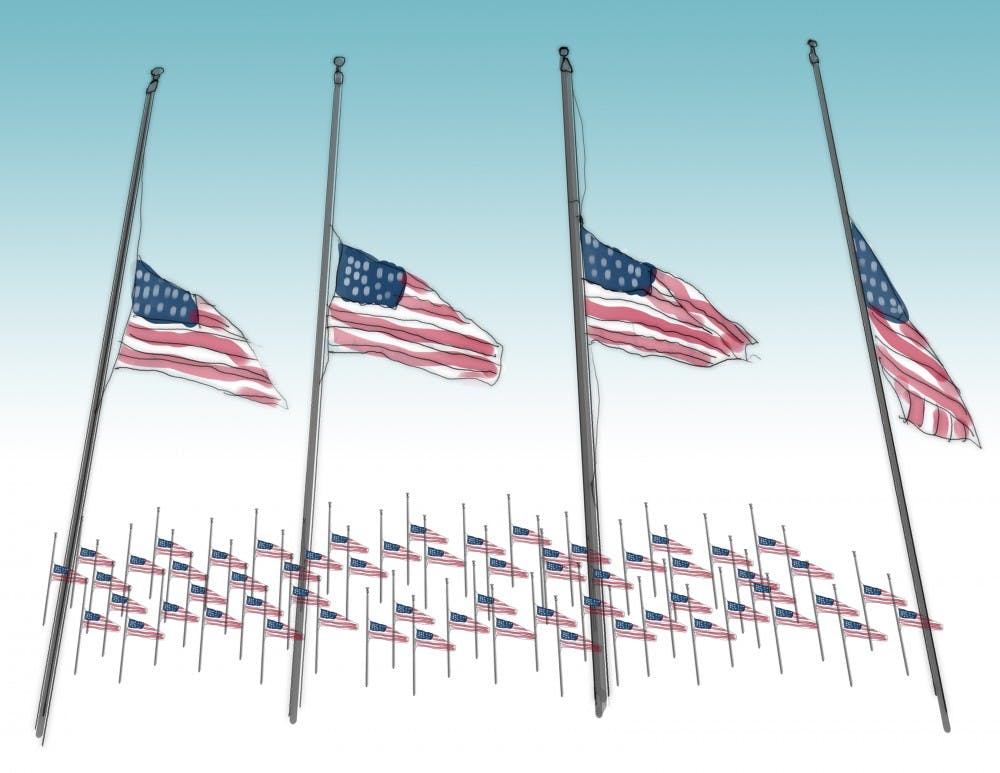The same calls to action that followed the Virginia Tech shooting in 2007 reemerged last year, when the massacre of 49 at Orlando’s Pulse nightclub replaced the carnage in Blacksburg as the deadliest.
In the past week, dozens of legislators have echoed those hollow promises America has grown so used to hearing, claiming “this has to stop” and “the time to act is now.”
Each time our lawmakers have pledged to put politics aside and work together toward a solution, and each time the discussion has quietly evaporated, not to surface again until another mass shooting occurs.
Following the Orlando shooting last year, Democrats held a 25-hour sit-in on the House floor to protest their Republican counterparts’ inaction on a gun control vote. During the brief window in which C-SPAN’s cameras were turned off, some participants pulled out their phones and began to livestream the event on their personal Facebook and Twitter accounts.
In just a matter of minutes, Democrats provided a perfect example of why “politicization” has come to be such a negative term: politicians exploiting issues of life and death for their own gain.
Not even the terrifying assault on a group of Republican congress members playing baseball in July sparked a bipartisan legislative effort on gun control.
Among the four wounded was Louisiana Representative Steve Scalise, who was shot in the hip and spent months in critical condition. He did not return to the House until Sept. 28, having been in the hospital since June.
Scalise continues to tout his A+ rating from the National Rifle Association and his commitment to protecting civilians’ right to bear arms, apparently not even swayed by his own brush with death at the hands of a malicious American with a gun.
Irrational as they are, Scalise’s moral convictions still ring truer than those of many of his peers in Congress. And while they may lie on the side of gun control reform, Democrats are just as guilty as Republicans for failing to enact change on firearm policy. The fact that something as appalling as a mass shooting still fails to persuade our congressmen to work together is one of the most bitter byproducts of our party system.
After the Pulse nightclub shooting last year, Democrats introduced four bills that would have closed the so-called “gun show loophole” and barred individuals on the FBI’s terrorist watch list from purchasing firearms. All four measures were voted down along party lines just eight days after the shooting.
During his second term, President Obama signed an executive order requiring that individuals unable to work due to do severe mental impairments be reported to the National Instant Criminal Background Check System, effectively blocking their ability to purchase guns.
In March, President Trump signed a resolution overturning the rule, and just like that, one of the few critical gun control policies Obama managed to run through the congressional gauntlet was reversed by virtue of partisan politics.
To get the day's news and headlines in your inbox each morning, sign up for our email newsletters.
Holding back tears on his show Monday, Jimmy Kimmel said: “It feels like someone has opened a window into Hell.”
Painful as it is to admit, this hell is all too familiar to those living in our country who have already witnessed Columbine, Virginia Tech, Orlando, Aurora, San Bernardino and the like.
The most unspeakable of these tragedies, the massacre of 20 six- and seven-year-olds in Newtown, Conn., also offers the saddest truth about our country’s gun problem.
In the words of political commentator Dan Hodges: “Sandy Hook marked the end of the U.S. gun control debate. Once America decided killing children was bearable, it was over.”
House Democrats introduced a bill Tuesday that would ban sales of bump stocks, the device Paddock clipped to 12 of his 23 weapons to make them fire even more rapidly. Some on the GOP side have tentatively agreed to support the proposed bill, but even Rep. Scalise claimed he didn’t want Congress to begin examining bump stocks.
The NRA issued a statement Thursday morning voicing similar concerns over the accessory’s legality, but the association’s Executive Vice President Wayne LaPierre later clarified that any regulation on the device should be handled by the Trump administration rather than Congress.
If the past week in Washington is any indication, the gun control debate might have reignited, but to Hodges’ point, debates end with resolutions. We can only hope this one does.




